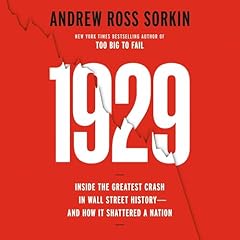
The Great Contraction, 1929-1933
No se pudo agregar al carrito
Add to Cart failed.
Error al Agregar a Lista de Deseos.
Error al eliminar de la lista de deseos.
Error al añadir a tu biblioteca
Error al seguir el podcast
Error al dejar de seguir el podcast
 Exclusivo para miembros Prime: ¿Nuevo en Audible? Obtén 2 audiolibros gratis con tu prueba.
Exclusivo para miembros Prime: ¿Nuevo en Audible? Obtén 2 audiolibros gratis con tu prueba.Compra ahora por $19.10
-
Narrado por:
-
A. C. Fellner
-
De:
-
Milton Friedman
Published as a stand-alone paperback in 1965, The Great Contraction, 1929-1933 argued that the Federal Reserve could have stemmed the severity of the Depression, but failed to exercise its role of managing the monetary system and ameliorating banking panics. The book served as a clarion call to the monetarist school of thought by emphasizing the importance of the money supply in the functioning of the economy--a concept that has come to inform the actions of central banks worldwide.
This edition of the original text includes a new preface by Anna Jacobson Schwartz, as well as a new introduction by the economist Peter Bernstein. It also includes comments from the current Federal Reserve chairman, Ben Bernanke, originally made on the occasion of Milton Friedman's 90th birthday, on the enduring influence of Friedman and Schwartz's work and vision.
©2008 Milton Friedman (P)2009 Audible, Inc.Los oyentes también disfrutaron:




















Las personas que vieron esto también vieron:








Surprising, but dry.
Se ha producido un error. Vuelve a intentarlo dentro de unos minutos.
In the last chapter of the book in the last section of the book has been Bernacki speaks of comparisons that Friedman made to the leadership of the fed following Strong‘s death in 1929, direct parallels can be made to his replacement Harrison and Jerome Powell of today. Both were attorneys, both lacked power persuasion., Both were ineffective leaders. Trump’s effort replace Howell by Kevin warsh where his equivalent are essential to matching a monetary policy to his expensive growth policies.
Toward the end of the book in this section of evaluation, one of the things mentioned with the mistake that they made and assuming that that low nominal interest rate was a threat to of inflation. He showed this and discussed this to be wrong and let the fed in the wrong direction leading to the 1934 and on depression to follow.
Latest economic readings show the second quarter growth GDP at 3.8% and that industrial output is exceeding consumption. This means that supply is out pacing demand and should allow for rapid growth with lower interest rates and not lead to inflation.
God help us all. And I’m really rooting for Kevin.
You must read and understand this to think you understand anything
Se ha producido un error. Vuelve a intentarlo dentro de unos minutos.
Great Book
Se ha producido un error. Vuelve a intentarlo dentro de unos minutos.
Wait for it...
Se ha producido un error. Vuelve a intentarlo dentro de unos minutos.
Would you consider the audio edition of The Great Contraction, 1929-1933 to be better than the print version?
Yes. I tend to fall asleep reading a complicated book.Who was your favorite character and why?
N/AWhat about A. C. Fellner’s performance did you like?
Easily understood.Did you have an extreme reaction to this book? Did it make you laugh or cry?
It was very sad to realize how much hardship for so many was caused by misguided government policies!A different explanation for the Great Depression.
Se ha producido un error. Vuelve a intentarlo dentro de unos minutos.


